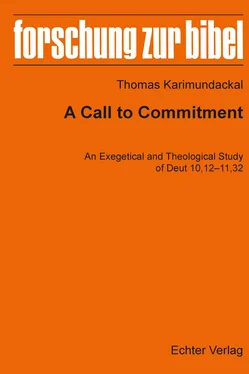46Cf. PECKHAM, Composition, 54; BARKER, Grace, 100.
47MILLAR, Living, 67; PECKHAM, Composition, 56-57; BRAULIK, Deuteronomium, 83, and ROSE, Mose, 515, consider that the command to arise and lead the people to possess the land is the climax of the whole account of the golden calf. CAIRNS, Deuteronomy, 110, considers 10,10 as a reversal and summary of 9,9-29, especially alluding to 9,9.19.25.
48Cf. BOORER, Land, 295-296.
49Deuteronomy basically contains three major addresses (1,6-4,40; 5,1b-26,19/28, 1-69; 29,1-30,20) and two poems (32,1-43; 33,2-29) of Moses. In addition to these, there are the words of Moses together with the elders of Israel (27,1), the Levitical priests (27,9-10), and the words of the blessings and curses that are to be recited in the covenant renewal ceremony (27,12-26) and the narrative conclusion to the song of Moses (32,46b-47). We hear Yhwh’s voice in 31,14b.16b-21.23b; 32,49-52 and 34,4b. The narrator’s voice is identified in 1,1-5; 2,10-12.20-23; 3,9. 11.13b-14; 4,41-43.44-5,1a; 10,6-9; 27,1a.9a.11; 28,68; 29,1; 31,1-2a.7a.9-10a.14a. 14c-16a.22-23a.24-25.30; 32,44-46a.48; 33,1-2a; 34,1-4a.5-12.
50The second person addressee in the chapter shifts largely from the second person plural (v1-12) to the second person singular (v13-31), although there are internal inconsistencies within these sections. For example, there is an alternation of 2mp to 2ms in 12,1 itself. LOHFINK, Opfer, 26, identifies the number change (“Numeruswechsel”) in Deut 12 and classifies the laws in Deut 12 accordingly. See also, LEVINSON, Deuteronomy, 24-25. For more detailed studies on “Numeruswechsel” in Deuteronomy see, LOHFINK, Hauptgebot, 239-257; BEGG, Numeruswechsel , 116 -124; MITCHELL, Use, 61-109.
51For a chiastic relationship between 11,31-32 and 12,1, cf. SEITZ, Studien, 40; MC-CONVILLE, Deuteronomy, 212; WOODS, Deuteronomy, 184.
52Similar references to a time in the future when Israel will keep specific laws ‘in the land’are found in 17,14; 18,9; 26,1; cf. Exod 12,25; 13,11; Lev 14,34; 19,23; 25,2; Num 15,2.18.
53There is a clear distinction in the use of המקום in ch. 11 and ch. 12. In 11,5 המקום refers to Moab (cf. 1,5); in 11,24 המקום refers to every place within the land which Israel will subdue. In 12,2-5 המקום refers to sanctuaries, both the sanctuary of the nations (v2.3), and that of the place, Yhwh will choose for his people (v5). MCCONVILLE, Time, 131, concludes that “there is a clear progression of “places” in the transition from ch. 11 to ch. 12”.
54MCCONVILLE, Law, 30-31, claims that it is the idea of Yhwh’s choosing the place that is in the foreground rather than the notion of a single place. The object of Yhwh’s choice in 21 out of 25 occurrences of the verb בחר in Deut 12-26 is “the place” (cf.12,5.11.14.18.21.26; 14,23.24.25; 15,20; 16,2.6.7.11.15.16; 17,8.10; 18,6; 23,17; 26,2). In other instances Yhwh chooses Israel itself (14,2), the kings (17,15), and the priests (18,5; 21,5).
55Mount Gerizim and Mount Ebal are geographically concretized in v30 by mentioning 30) ירדןa), 30) בארץ הכנעניa), 30) ערבהb) 30) גלגלb) 30) אצל אלוני מרהb).
56See also that the command to seek out and go to the place (המקום) which Yhwh will choose in v5-7 is set in deliberate contrast to the command to destroy the places (המקום) of the nations in v2-3.
5712,8) היום) appears only once in 12,1-31 to remind Israel not to do in the land what they are used doing in the plains of Moab.
58V8-11 draw the line between the present and a time in the future when the conditions are conducive for right worship. V8-9 bring Israel back to the plains of Moab as they imply that they have not yet come to their inheritance. But v8-11 assures them of a future point in time, and a place to which they shall bring their offerings, the tithe etc., cf. THELLE, Place, 68-72; MCCONVILLE, Time, 124.
59Deut 12 can be divided into four specific laws concerning cultic centralization and a concluding law concerned with cultic purity: v2-7 cultic purification and centralization; v8-12 temporal condition for centralization; v13-19 centralization and secular slaughter; v20-28 geographical condition for slaughter; v29-31 cultic purification. Cf. VON RAD, Deuteronomy, 89; MAYES, Deuteronomy, 22; LEVINSON, Deuteronomy, 24-25. BRAULIK, Gesetze, 23-29 and LEVINSON, Deuteronomy , 25-26, show a chiastic pattern of these laws.
60Cf. no. 23.
61In Deuteronomy המקום is usually accompanied by the verb בוא. However, we may notice a subtle contrast in their usage. The combination of המקום and בוא in Deut 1-11 shows the agency of Yhwh in Israel’s coming into the Promised Land. This is explicitly clear in the hiphil use of בוא with Yhwh as subject (cf. 4,38; 6,10.23; 7,1.26 etc.). However, the collocation of בוא and מקום in Deut 12-26 demands a response from Israel, for example, the hiphil use of בוא in Deut 12-26 demands an explicit response from the people (cf.12,6.11; 21,12; 23,19; 26,2.9.10). Although there are exceptions to this position (e.g., 26,9 [hiphil] and 26,1-3 [all in the qal] show the instrumentality of Yhwh) the combination of בוא and מקום in Deut 12-26 demands a faithful response from Israel. For the theological significance of the collocation of בוא and מקום in Deuteronomy, cf. MCCONVILLE, Law, 33-35.
62Cf. no. 21. Actually the beginning clause אלה העדת והחקים והמשׁפטים in 4,45 does not appear to be a fresh beginning but an explanation of the heading וזאת התורה אשׁר־שׂם משׁה לפני בני ישׂראל in 4,44, cf. DEROUCHIE, Call , 49-50. To see how asyndetic sentences are frequently used in explicatory sense, cf. DEMPSTER, Linguistic Features, 46. For a synonymous reading of 4,44-45, see CRAIGIE, Deuteronomy, 146. LONGACRE, Building, 29-30, sees 4,44-45 as cleft sentences, and notes how such constructions often lie on the boundaries of text units (cf. 6,1; 12,1; 28,69). However, LOHFINK, Neubegrenzung, 237-38, and DRIVER, Deuteronomy, 79-80, consider 4,44 as a secondary intrusion in the final composition of Deuteronomy.
63We come across variations on the centralization formula in the chapter (“the place that Yhwh your God will choose” המקום אשׁר־יבחר יהוה אלהיכם; v5.11.14.18.21.26). There is a short form without any further elaboration (v18.26; cf.14,25; 15,20; 16,7.15.16; 17,8.10; 18,6; 31,11), and a long form with various additions: with “out of all your tribes” (v5); “in one of your tribes” (v14); “to put his name there” (v5.21; cf. 14,24); “to make his name dwell there” (v5.11; cf. 14,23; 16,2.6.11; 26,2). For a detailed analysis of the centralization formula in Deuteronomy, cf. HALPERN, Formula, 20-38; LEVINSON, Deuteronomy, 23-50; LOHFINK, Zentralisationformel, 357-85; ROFÉ, Centralization, 221-26; SUZUKI, Place, 338-52; WEIPPERT, Ort, 76-94; BRAULIK, Gesetze, 23-33.
64שׂמח occurs in seven centralization formulae (12,7.12.18; 14,26; 16,11.14; 26,11). On this theme see, BRAULIK, Freude, 161-218; WILLIS, Rejoice, 276-94.
65On the rhetorical connections between the closing verses of ch. 11 and the beginning of ch. 12, see LOHFINK, Neubegrenzung, 249-250.
66MCCONVILLE, Law, 64 and NELSON, Deuteronomy, 157, observe that certain features of the prohibition in 12,1-4 reappear in reverse order in 12,29-13,1, i.e. there is an inversion between “you shall observe to do” (v1) + examples of pagan worship (v2) + “you shall not do so toward Yhwh” (v4) and “you shall not do so toward Yhwh” (v31) + an example of pagan worship (v31) + “you shall observe to do” (13,1).
Читать дальше












